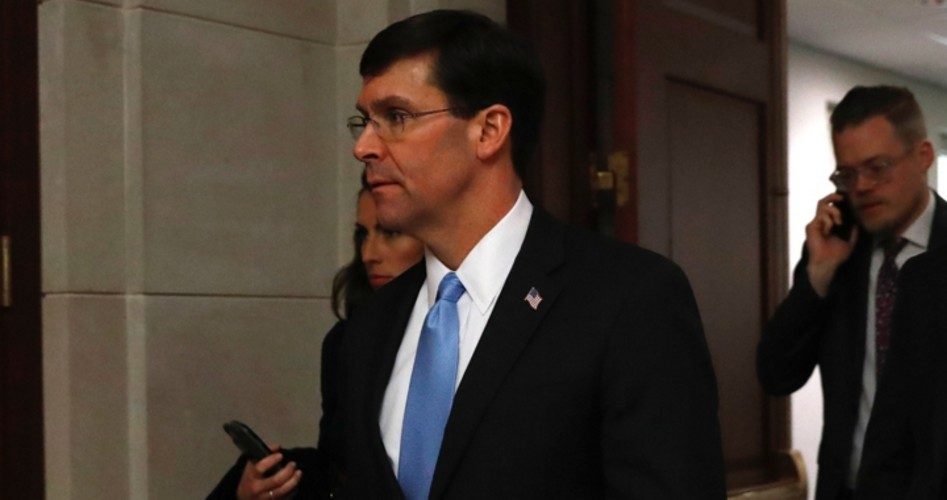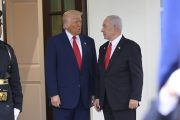
Defense Secretary Mark Esper said Sunday he had seen no evidence suggesting that Iranian General Qassem Soleimani was plotting attacks on four U.S. embassies at the time of his January 3 assassination by U.S. forces, contradicting President Donald Trump’s assertion of just two days earlier.
“I didn’t see one [specific piece of evidence] with regard to four embassies,” Esper said on CBS’ Face the Nation.
That was not the impression left by Trump when he appeared on Fox News’ The Ingraham Angle Friday. On the heels of a Thursday appearance by Secretary of State Mike Pompeo, who said that while an Iranian attack was “imminent,” “we don’t know precisely when and we don’t know precisely where,” Trump apparently felt the need to be more definite. “I can reveal,” the president said, “that I believe it probably would’ve been four embassies.”
Esper was then left in the unenviable position of defending Trump’s statement despite having no concrete evidence to support it. Instead, he simply said he “share[d] the president’s view” that Iran was going to attack embassies in the region because “the embassies are the most prominent display of American presence in a country.”
Later in the day, on CNN’s State of the Union, Esper was a bit more supportive of Trump’s claim but still stopped short of saying there was any evidence for it. “What the president said in regard to the four embassies is what I believe as well,” he said. “And he said he believed that they probably, that they could have been targeting the embassies in the region.”
Hunches, however, are hardly a substitute for solid evidence, especially when it comes to acts of war, which Soleimani’s killing undoubtedly was. Yet the Trump administration, much like its predecessors, seems to want to wage war on a “trust us” basis, providing little in the way of concrete proof of its assertions to either the public or Congress, which is constitutionally charged with deciding whether the United States goes to war.
The administration’s “public explanations have shifted by the day and sometimes by the hour,” observed the New York Times:
They had to kill him because he was planning an “imminent” attack. But how imminent they could not say. Where they could not say. When they could not say. And really, it was more about what he had already done. Or actually it was to stop him from hitting an American embassy. Or four embassies. Or not.
Indeed, the administration has accused Soleimani of everything from being involved in the 9/11 attacks to plotting assaults on U.S. embassies and bases that could, in Pompeo’s words, have taken “hundreds of lives.” But as the Times pointed out, “No attack in the Middle East over the past two decades, even at the height of the Iraq war, has ever resulted in so many American casualties at once in part because embassies and bases have become so fortified.”
The administration has also been less than forthcoming with Congress, even when speaking to members with the highest security clearances. After a briefing last Wednesday, Senators Mike Lee (R-Utah) and Rand Paul (R-Ky.) publicly aired their disgust with the administration’s approach. Lee called it “the worst briefing I’ve seen” and said he found it “insulting and demeaning” that the administration said Congress would “embolden” Iran by debating Trump’s war powers. Paul deemed the briefing “less than satisfying” and chastised the administration for trying to justify the Soleimani assassination based on the 2002 authorization for war with Iraq. At the opposite end of the political spectrum, House Intelligence Committee Chairman Adam Schiff (D-Calif.) told Face the Nation, “Frankly, I think what they are doing is overstating and exaggerating what the intelligence shows. In the view of the briefers, there was plotting, there was an effort to escalate being planned, but they didn’t have specificity.”
In short, the administration wants the American people and their elected officials to take its word for it that it has specific intelligence that justifies the assassination of Soleimani. The irony, the Times notes, is that “Trump himself has made clear in other circumstances that he does not trust the intelligence agencies that he is now citing.” Why should anyone else?
Photo: AP Images
Michael Tennant is a freelance writer and regular contributor to The New American.




